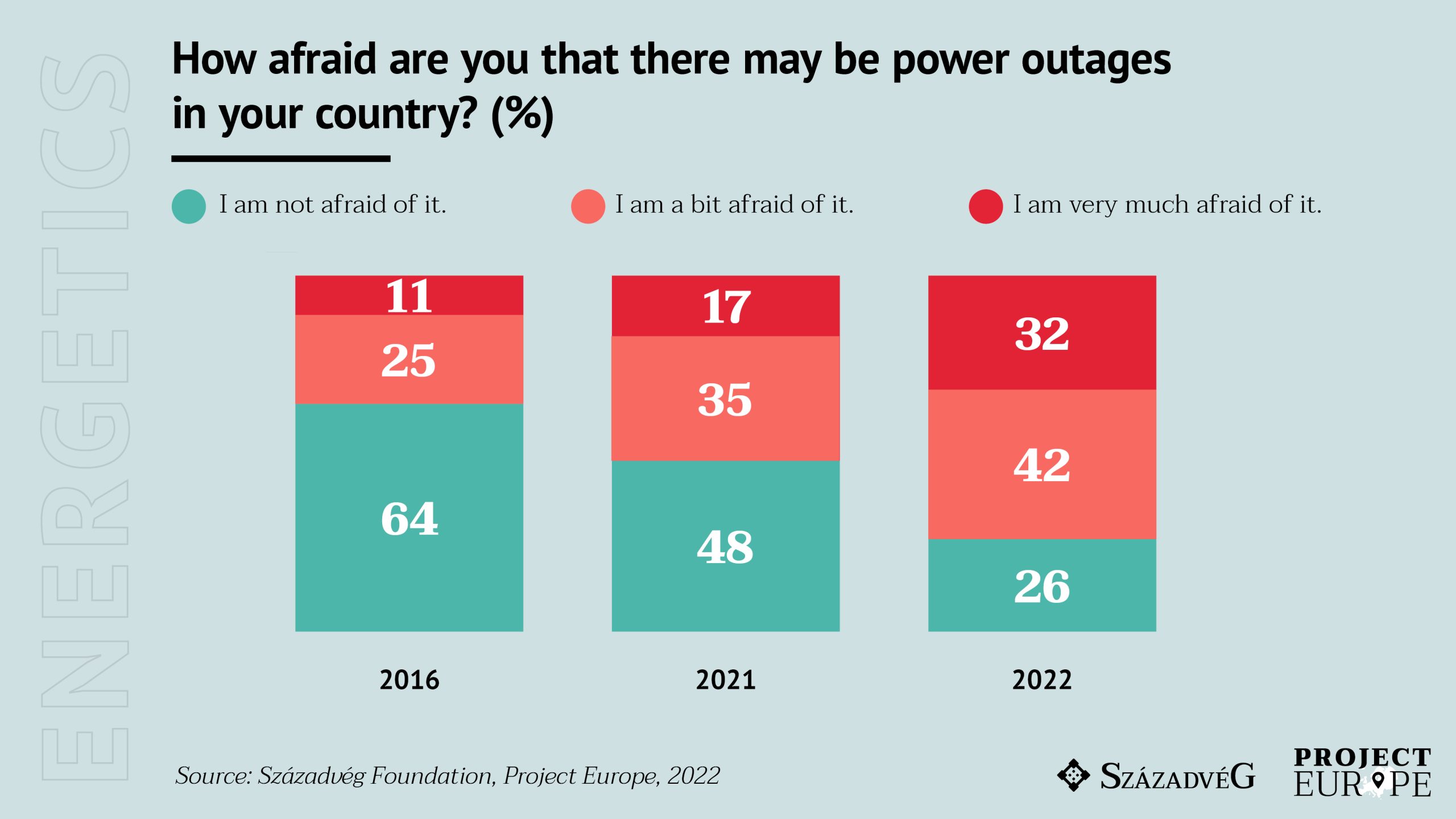The priority of energy policy is to ensure continuous and uninterrupted supply. The social image of the successful completion of the task can be easily measured by the development of the population’s fear of power outages. Therefore, following the data collection of the European Social Survey in 2016, Századvég asked Europeans in the months before the outbreak of the European energy crisis (between 1 August and 15 September 2021) and in the autumn of 2022 about how much they fear power outages.
The fear of power failure is constantly growing
Even the results of research prior to the energy crisis showed that Europeans have less and less confidence in energy supplies. While in 2016 almost two-thirds (64 percent) of respondents said they were not afraid of power outages, this percentage dropped to 48 percent by 2021. At the same time, the proportion of Europeans who are very much afraid of the problem has risen from 11 to 17 percent. The deteriorating trend can be explained mainly by the fact that, following the policy ambitions of Brussels, a considerable number of EU Member States have dismantled their traditional energy generation and conversion capacities and long-term supply contracts, which has made Europe’s energy system more unpredictable.
Following the outbreak of the energy crisis, the deteriorating trend accelerated and the proportion of those who are very much afraid of blackouts increased from 17 to 32 percent in just one year, while the proportion of respondents trusting uninterrupted supply fell from 48 to 26 percent. In addition to the general deterioration in mood caused by the energy crisis and Brussels’ sanctions policy, the fact that several Member States have carried out media campaigns to raise public awareness of the growing potential for supply disruptions is believed to have contributed to the process.
Only Hungary has a majority of those who trust the energy supply
There are significant differences between EU Member States in terms of fear of power outages. Poles (17 percent), Greeks (18 percent) and Italians (21 percent) are the least confident of uninterrupted supply. Based on the results, the differences between individual Member States are mainly caused by two factors. On the one hand, the escalating trade conflict has affected each country’s energy supply to varying degrees. Poland, for example, introduced independent sanctions, in addition to common European punitive measures, as a result of which Russian energy purchases were significantly reduced in the early stages of the war. On the other hand, due to the different tariff regulations for households in the Member States, the increase in energy prices across the EU represents a different burden in the individual countries. As pointed out in a previous report, Greece has the highest proportion of people with heating and fee difficulties. Existential difficulties also significantly reduce confidence in security of supply.
The only EU Member State with a majority of those who trust in the security of energy supply is Hungary. And the percentage of those who are very much afraid of power outages is the lowest in our country: 15 percent. The positive result in European comparison is due, on the one hand, to the fact that Hungary fought for an exemption from EU punitive measures that threaten its energy supply. On the other hand, the Hungarian government’s utility cost reduction program prevents drastically increased market energy prices from spilling over into residential tariffs, so Hungarians are less affected by adverse existential effects in addition to supply security threats.
In the first half of 2016, the Századvég Foundation conducted a public opinion poll survey covering all 28 European Union Member States, with the aim to analyse the opinions of EU citizens regarding the issues that most affect the future of the EU. In a unique way, Project 28 conducted the widest possible survey of 1,000, that is a total of 28,000 randomly selected adults in each country. Gaining an understanding of society’s sense of prosperity and mapping the population’s attitudes towards the performance of the European Union, the migration crisis and the increasing terrorism were among the most important goals of the analysis. Following the surveys in 2017, 2018 and 2019, on behalf of the government, the Századvég Foundation has been conducting the research under the name of Project Europe since 2020, which continued to reflect on the topics that most dominated the European political and social discourse.
In 2022, the aim of the survey is again to map the population’s attitude towards the most important public issues affecting our continent. In addition to society’s sense of prosperity, the performance of the European Union, the coronavirus pandemic, climate change, and the perception of the migration crisis, in line with the latest challenges affecting Europe, the dominant theme of this year’s poll has been the Russian-Ukrainian war, the energy crisis, energy supply, and family policy. In addition to the European Union Member States, the 2022 research covered the United Kingdom, Norway, Switzerland, Moldova, Albania, Kosovo, North Macedonia, Montenegro, Serbia, Turkey, and Bosnia and Herzegovina, and surveyed a total of 38,000 randomly selected adults using the CATI method between 13 October and 7 December.


